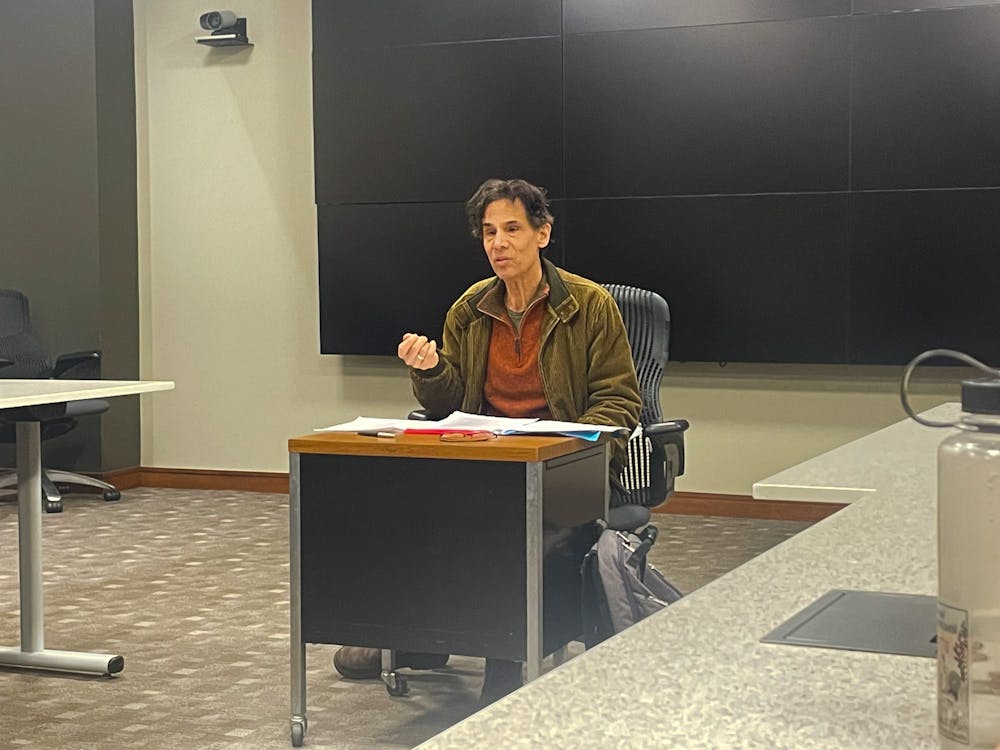Leslie Marmon Silko, a celebrated Laguna Pueblo author, issued a warning at the beginning of her debut novel “Ceremony,” published in 1977.
“You don’t have anything,” Silko wrote, “if you don’t have the stories.”
But that warning can also be “heard as a message of hope,” Professor of Religious Studies and Chair of the Department of Religious Studies Mark Cladis said at a Wednesday afternoon lecture, “Leslie Silko and the Power of Indigenous Storytelling: Healing and Resistance in Defiance of Settler Colonialism,” hosted by the Native American and Indigenous Studies Initiative.
“You have everything, or at least much, if you have the stories,” he said. “Powerful, vital resources for healing, resilience, resistance and social transformation.”
Cladis said that he primarily engages with Silko and Indigenous storytelling through “listening” to the stories she weaves “from her life and Indigenous traditions.”
From his extensive study of Silko’s literature and background, Cladis said he became familiar with “radical Romanticism,” a concept that interprets the romantic movement of the late 18th and early 19th century towards “progressive democratic and environmental aims,” Cladis wrote in a 2014 journal article.
“The radical romanticism I initially viewed was through a Navajo lens,” Cladis said. “Witnessing their intimate, practical connection to land and places, I’ve learned about alienation as being severed from land, culture, language (and) stories.”
“When we think of romanticism, we often think of the sublime,” he continued. “We think of an individual gazing out at the world, but that is not what radical romanticism is focused on.”
Radical romanticism— which is “focused on poignant human encounters, events and experiences of war, empire, misogyny, white supremacy, environmental degradation and oppressive political and religious authorities” — carries more weight than traditional romanticism, Cladis said. For him, the concept is both an “intellectual tradition” and “a way of life” that cultivates perspectives, practices and aspects that bring dignity and justice to the human world.”
Cladis discussed Silko’s experience in law school, during which she dropped out early because of what Cladis described as “the savagery of the U.S. settler legal system.” In Silko’s collection of essays, “Yellow Woman and a Beauty of the Spirit,” Cladis recalled her writing that the “only way to seek justice was through the power of stories” — a motto he said embodies the essence of radical romanticism.
Storytelling “is not principally a form of entertainment,” Cladis said. “Storytelling is a survival skill.”
“Indigenous storytelling as a practice predates the arrival of white settlers,” he added. “And the stakes (were high) … in combating (the) white settler colonialism that has produced the racism, dispossession, environmental catastrophe and attempted genocides of Indigenous peoples.”
Rae Gould, executive director of the Native American and Indigenous Studies Initiative, commended Cladis for examining the “intersections” of his “interests in environmentalism and Indigenous knowledge,” noting that she “really learned a lot.”
Ariana Clark ’23, who attended the lecture, noted that she initially came to Cladis’s talk because of his reputation as an ecology professor.
“I thought his reading was great,” Clark said. “It definitely inspired me to read the author he was referencing. I found that he did a good job at providing an academic synthesis to a topic I’m pretty familiar with — Native ways of storytelling.”
“I’ve always thought of romanticization as a colonial concept, so it was interesting to learn about it from a different perspective,” she added.
(Additional reporting by Ryan Doherty.)

Sofia Barnett is a University News editor overseeing the faculty and higher education beat. She is a junior from Texas studying history and English nonfiction and enjoys freelancing in her free time.





